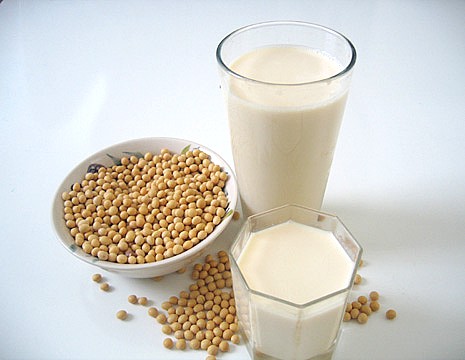นักวิทยาศาสตร์สหรัฐฯอ้างว่า ถั่วเหลืองสามารถช่วยพิทักษ์ผู้ชายจากโรคมะเร็งของต่อมลูกหมาก และศีรษะล้านได้
นักวิทยาศาสตร์ของวิทยาลัยสัตวแพทย์โคโลราโด ศาสตราจารย์โรเบิร์ต แฮนดา ได้พบ โมเลกุลในลำไส้ขณะกำลังย่อยถั่วเหลืองชนิดหนึ่ง สามารถขัดขวางฮอร์โมนอย่างหนึ่งไม่ให้ไปเติมเชื้อเพลิงให้กับมะเร็งต่อมลูกหมากหรือเป็นเหตุให้ศีรษะล้าน
เขารายงานการค้นพบนี้ในวารสารวิชาการ "ชีววิทยาของการสืบพันธุ์" ว่า ทั้งนี้อาจเป็นสาเหตุที่บอกให้รู้ว่า เหตุที่ผู้ชายญี่ปุ่นไม่ค่อยเป็นมะเร็งต่อมลูกหมากนั้น เพราะกินถั่วเหลืองกันมากนั่นเอง โมเลกุลตัวนี้อาจจะเอาไปใช้ทั้งรักษามะเร็งอวัยวะสำคัญของผู้ชายกับแก้ศีรษะล้านได้ด้วย นอกจากนั้นยังปรากฏว่าในการฉีดโมเลกุลนี้ให้กับหนูในการทดลองปรากฏว่าทำให้ขนาดของต่อมลูกหมากยุบลง โดยไม่ก่อให้เกิดผลข้างเคียงอย่างใดด้วย
โดย ไทยรัฐฉบับพิมพ์
15 มิถุนายน 2553, 08:00 น.
Soy & Curcumin Reduce Prostate-Specific Antigen (PSA)
This study consisted of both a laboratory experiment and a small clinical research trial with human volunteers. In the laboratory portion of this study, human prostate cancer cells were treated with soy isoflavones and curcumin. When these prostate cancer cells were treated with soy isoflavones and curcumin, the production of PSA by these cells was dramatically decreased. Moreover, a receptor for male sex hormones, which prostate cancers use to fuel their growth, was significantly suppressed following treatment of these cells with soy isoflavones and curcumin.
In the clinical portion of this research study, men who had undergone prostate gland biopsies due to an elevated PSA blood level, but who were subsequently found not to have prostate cancer, were also evaluated. In this prospective, randomized, placebo-controlled trial, 85 men without prostate cancer, but with elevated blood PSA levels, were divided into two groups. The “experimental group” of men received curcumin and soy isoflavones once per day. The “control group” of men received a placebo (“sugar pill”) once per day. Neither group of male volunteers, nor the research assistants who dispensed these pills, knew which men received the placebo pills and which received the soy isoflavone and curcumin pills.
PSA levels were tested in all of these male volunteers at the beginning of the study, and 6 months later. Among the men randomized to receive daily supplements of soy isoflavones and curcumin, the level of PSA in their blood dramatically declined following 6 months of supplementation with soy isoflavones and curcumin.
While the results of this small and elegant research study do not prove that soy isoflavones and curcumin can actually prevent prostate cancer in humans, these results do suggest, at least, a biological mechanism whereby these dietary compounds might reduce the risk of developing prostate cancer, and might also have anti-cancer effects in patients with prostate cancer. However, only large-sale prospective, randomized, blinded, placebo-controlled human clinical trials will be able to prove that these dietary compounds can actually prevent or effectively treat prostate cancer.
At this time, there are multiple ongoing and recently completed prostate cancer prevention and treatment clinical research trials using soy isoflavone supplements. The results of several of these studies will, hopefully, become available within the next 3 to 5 years.
While there are multiple cancer prevention and cancer treatment research trials underway that are evaluating curcumin, none of these ongoing curcumin clinical trials are focused on prostate cancer, unfortunately.
Based upon the findings of this small and innovative research study of soy isoflavones and curcumin, the next logical step would be a large prospective, randomized, placebo-controlled, blinded study that randomizes patient volunteers to placebo, versus soy isoflavones only, versus curcumin only, versus a combination of soy isoflavones and curcumin. A cancer prevention study could look at prostate cancer incidence in men who are already at high risk of developing this common form of cancer. A prostate cancer treatment study, using the same methods, could assess the clinical impact of soy isoflavones and curcumin on the progression or recurrence of prostate cancer in men who have already been diagnosed with this form of cancer.
To learn more about the role of soy isoflavones and curcumin as potential cancer prevention nutrients, look for the publication of my new landmark evidence-based book, “A Cancer Prevention Guide for the Human Race,” in the summer of this year.
http://mensnewsdaily.com/2010/05/23/soy-curcumin-reduce-prostate-specific-antigen-psa/



No comments:
Post a Comment